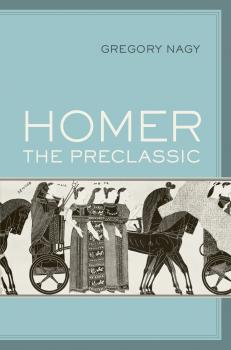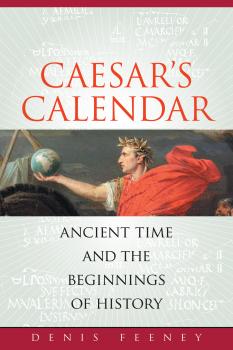ТОП просматриваемых книг сайта:















Sather Classical Lectures
Скачать книги из серии Sather Classical LecturesАннотация
Classicism and Christianity in Late Antique Latin Poetry - Prof. Philip Hardie
Sather Classical LecturesАннотация
After centuries of near silence, Latin poetry underwent a renaissance in the late fourth and fifth centuries CE evidenced in the works of key figures such as Ausonius, Claudian, Prudentius, and Paulinus of Nola. This period of resurgence marked a milestone in the reception of the classics of late Republican and early imperial poetry. In <I>Classicism and Christianity in Late Antique Latin Poetry,</I> Philip Hardie explores the ways in which poets writing on non-Christian and Christian subjects used the classical traditions of Latin poetry to construct their relationship with Rome’s imperial past and present, and with the by now not-so-new belief system of the state religion, Christianity. The book pays particular attention to the themes of concord and discord, the "cosmic sense" of late antiquity, novelty and <I>renouatio</I>, paradox and miracle, and allegory. It is also a contribution to the ongoing discussion of whether there is an identifiably late antique poetics and a late antique practice of intertextuality. Not since Michael Robert's classic <I>The Jeweled Style</I> has a single book had so much to teach about the enduring power of Latin poetry in late antiquity.<BR />  
Аннотация
Visual culture was an essential part of ancient social, religious, and political life. Appearance and experience of beings and things was of paramount importance. In <I>Visual Power in Ancient Greece and Rome</I>, Tonio Hölscher explores the fundamental phenomena of Greek and Roman visual culture and their enormous impact on the ancient world, considering memory over time, personal appearance, conceptualization and representation of reality, and significant decoration as fundamental categories of art as well as of social practice. With an emphasis on public spaces such as sanctuaries, agora and forum, Hölscher investigates the ways in which these spaces were used, viewed, and experienced in religious rituals, political manifestations, and social interaction.
Аннотация
From even before the time of Alexander the Great, the Greek gods spread throughout the Mediterranean, carried by settlers and largely adopted by the indigenous populations. By the third century b.c., gods bearing Greek names were worshipped everywhere from Spain to Afghanistan, with the resulting religious systems a variable blend of Greek and indigenous elements. <I>Greek Gods Abroad</I> examines the interaction between Greek religion and the cultures of the eastern Mediterranean with which it came into contact. Robert Parker shows how Greek conventions for naming gods were extended and adapted and provides bold new insights into religious and psychological values across the Mediterranean. The result is a rich portrait of ancient polytheism as it was practiced over 600 years of history.
Аннотация
What made the Romans laugh? Was ancient Rome a carnival, filled with practical jokes and hearty chuckles? Or was it a carefully regulated culture in which the uncontrollable excess of laughter was a force to fear—a world of wit, irony, and knowing smiles? How did Romans make sense of laughter? What role did it play in the world of the law courts, the imperial palace, or the spectacles of the arena?<br> <br> <i>Laughter in Ancient Rome</i> explores one of the most intriguing, but also trickiest, of historical subjects. Drawing on a wide range of Roman writing—from essays on rhetoric to a surviving Roman joke book—Mary Beard tracks down the giggles, smirks, and guffaws of the ancient Romans themselves. From ancient «monkey business» to the role of a chuckle in a culture of tyranny, she explores Roman humor from the hilarious, to the momentous, to the surprising. But she also reflects on even bigger historical questions. What kind of history of laughter can we possibly tell? Can we ever really «get» the Romans’ jokes?
Аннотация
Where does the notion of free will come from? How and when did it develop, and what did that development involve? In Michael Frede's radically new account of the history of this idea, the notion of a free will emerged from powerful assumptions about the relation between divine providence, correctness of individual choice, and self-enslavement due to incorrect choice. Anchoring his discussion in Stoicism, Frede begins with Aristotle–who, he argues, had no notion of a free will–and ends with Augustine. Frede shows that Augustine, far from originating the idea (as is often claimed), derived most of his thinking about it from the Stoicism developed by Epictetus.
Аннотация
Most of the everyday writing from the ancient world—that is, informal writing not intended for a long life or wide public distribution—has perished. Reinterpreting the silences and blanks of the historical record, leading papyrologist Roger S. Bagnall convincingly argues that ordinary people—from Britain to Egypt to Afghanistan—used writing in their daily lives far more extensively than has been recognized. Marshalling new and little-known evidence, including remarkable graffiti recently discovered in Smyrna, Bagnall presents a fascinating analysis of writing in different segments of society. His book offers a new picture of literacy in the ancient world in which Aramaic rivals Greek and Latin as a great international language, and in which many other local languages develop means of written expression alongside these metropolitan tongues.









